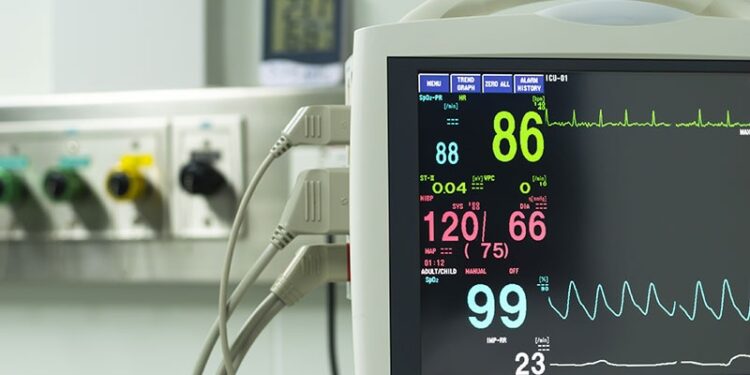Initiating intensive blood pressure (BP) lowering within a few hours of intracerebral hemorrhage (ICH) was associated with better neurologic outcomes, fewer serious adverse events, and better mortality compared to the more conservative standard treatment, new research confirmed.
Best results were found when treatment was administered within 3 hours of ICH symptoms, a pooled analysis of the four Intensive BP Reduction in Acute Cerebral Hemorrhage Trials (INTERACT1-4) showed.
While current guidelines set a target systolic BP of < 180 mm Hg within 1 hour of ICH symptom onset, the intensive treatment systolic target is < 140 Hg within 1 hour.
The new findings were published online on June 18 in The Lancet Neurology.
Timing Dependent?
In addition to evaluating the safety and efficacy of early intensive treatment for ICH, the investigators also aimed to assess the impact of treatment timing.
The INTERACT1-3 studies included 10,269 adults with acute ACH who presented within 6 hours of symptom onset and had a systolic BP of > 150 mm Hg.
INTERACT4 included 1043 patients with suspected acute stroke who had a systolic BP of ≥ 150 mm Hg within 2 hours of symptom onset. In addition, 1029 study participants had a hemorrhagic form of stroke.
All were randomly assigned to receive either intensive or guideline recommended BP-lowering treatment with locally available BP drugs within 1 hour.
Scores on the modified Rankin scale were used to determine functional recovery, the primary outcome measure for the pooled analysis.
Additionally, a CT substudy of nearly 3000 INTERACT participants was conducted to measure hematoma volume.
Mean systolic BP rates at 1 hour were significantly lower for the intensive treatment group compared to the guideline group (149.6 mm Hg vs 158.8 mm Hg, respectively; P < .0001).
Poor physical function, defined as a modified Rankin scale score of 3-6 at the end of follow-up, was significantly less likely after intensive BP lowering (odds ratio [OR], .85; P = .0001).
The intensive group also had reduced odds of neurologic deterioration within 7 days compared to the guideline group (OR, .76; P = .0002), as well as lower odds of any serious adverse event (OR, .84; P = .0003) or death (OR, .83; P = .002).
CT substudy results showed no significant effect on either relative or absolute hematoma growth in the first 24 hours from intensive vs guideline treatment.
However, when intensive BP lowering was initiated within 3 hours of symptom onset, functional recovery was improved and hematoma growth was reduced in almost 25% of the patients with serial CT scans, investigators noted.
Patients with mild-to-moderate severity, as measured by ICH scores, had even greater reductions in hematoma growth after early intensive BP-lowering treatment.
The new pooled analysis of all four INTERACT trials confirms findings from INTERACT4, presented at the 2024 European Stroke Organization Conference Annual Meeting and reported by Medscape Medical News.
‘Time Is Brain’
In an accompanying editorial, David J. Werring, PhD, Department of Translational Neuroscience and Stroke, University College London Queen Square Institute of Neurology, London, noted that several previous studies showed no benefit of BP lowering in acute ischemic stroke, “probably because acutely elevated blood pressure has a role in maintaining brain perfusion.”
However, the pathophysiology of stroke from ICH “is different, with a major role for hematoma expansion within the first few hours, a therapeutic target which might be reduced” by intensive BP lowering, he wrote.
Still, Werring noted that possible benefits need to be weighed against possible risks; and he pointed out several study limitations, such as the low severity of ICH overall and the inclusion of INTERACT3 data, which may have introduced confounding from BP lowering being just one component of its treatment “bundle,” alongside strict glucose control and anticoagulant reversal.
“Notwithstanding these important limitations, the data presented make a compelling case for ultra-early intensive blood pressure reduction as a potentially useful intervention to improve outcomes in people with acute ICH,” he wrote, adding that more research is needed.
“Meanwhile, the clear message from this meta-analysis is that earlier treatment is better, meaning that, once again, time is brain for patients with ICH,” Werring concluded.
The analysis was funded by a long list of organizations throughout the world, and the investigators reported numerous financial relationships, which are fully detailed in the original article. Werring reported receiving speaking and/or chairing honoraria and/or consultancy fees from Bayer, Alexion, NovoNordisk, and Alnylam, as well as participation on numerous data and safety monitoring or advisory boards. Full details are listed in the original editorial.
Source link : https://www.medscape.com/viewarticle/early-aggressive-blood-pressure-lowering-tied-better-ich-2025a1000gga?src=rss
Author :
Publish date : 2025-06-19 20:53:00
Copyright for syndicated content belongs to the linked Source.



